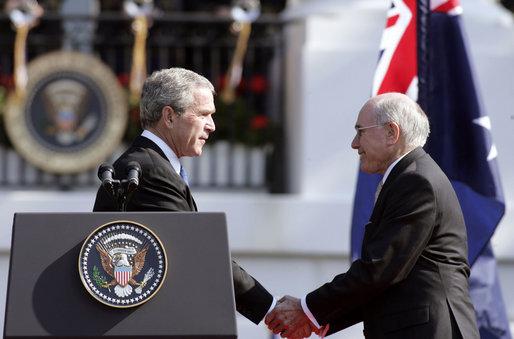Hasten slowly in the Middle East
Posted By Allan Behm on September 1, 2014 @ 06:00
 [1]
[1]Australia seems poised to send F/A-18 Super Hornets to support a ‘coalition of the willing’ in what’ll probably prove to be a futile attempt to contain the so-called Islamic State forces that are reshaping the political geography of Iraq and Syria.
Behind the public discussion—the talk of ‘humanitarian assistance’, the disaster of women and children being slaughtered willy-nilly, the need to defeat the cancer of terrorism—there’s evident confusion about the nature of the problem, its short-term strategic and political effects, the consequences of action/inaction for Iraq, Syria and the neighbouring states, and the ultimate impotence displayed by a reliance on air strikes alone.
Nor is there any exploration of how Australia’s strategic interests are engaged by the events that are unfolding in northern Iraq. Perhaps the answer is that they aren’t. Just as Australia’s strategic interests weren’t at stake in the genocides and humanitarian disasters that befell Africa during the past three decades—frightful though they continue to be—any deployment to assist militarily in Iraq also does not meet a strategic imperative.
Fundamentally, Australia’s core national interests aren’t threatened in Iraq. And to invoke ‘the war against terrorism’ and ‘attacks on our values’ as a justification for military action in Iraq is fundamentally to misunderstand what’s happening in northern Iraq and elsewhere in the Middle East.
The serial tragedies unfolding there are symptomatic of profound changes in power relationships and power balances as the death throes of the Ottoman Empire continue to affect the Middle East. The nineteenth-century colonial paradigm driving the carve-up of the Middle East following WWI—best exemplified in the Sykes–Picot Agreement [2] that drew straight lines on maps to accommodate British and French interests—created the instability inherent in the Middle East ever since. But, as we’ve seen in Africa and to some extent on the Indian sub-continent, cartography doesn’t resolve the underlying tensions between clans, tribes, ethnic groups and religious sects that have been jostling for supremacy or survival for more than a millennium.
The West’s fascination with the nation state reflects its preoccupation with the collective experience of European (and, by extension, North American and antipodean) polities since the Peace of Westphalia. And as we, in the guise of strategists, contemplate the meaning of Clausewitz’s dictum ‘war is the continuation of policy by other means’, we must understand that military power is a tool of the state and that, a fortiori, war is something that states do.
Australia’s reliability as an ally ready to support US adventures may serve US interests (though it’s difficult to see how US interests have been served by the destruction of Iraq and the creation of a failed state in Afghanistan). But the question that Australian governments must ask themselves is whether support for US-initiated and US-led military action serves either the interests of the states where force is to be used, or those of Australia.
It’s clear that the international community needs to address the humanitarian crisis in northern Iraq. It’s also clear that the US and Australia, as contributors to that crisis, have a future role to play. And it’s inevitable that at-risk populations will need security. But to take a unilateral approach to the problem—air strikes against IS forces—is to tackle a symptom of the problem, not its cause. Air strikes may offer some temporary solution, but they can’t deliver the stability necessary in the long term. Although it’s manifestly an imperfect vehicle, the UN and its agencies, guided by an appropriate Security Council resolution and a suitable peacekeeping force, prospectively offers a more effective solution.
And what of Australia’s interests? Successive Defence White Papers and Ministerial Statements have reaffirmed that Australia’s strategic interests are most deeply engaged in Asia and the Pacific. But as the Defence Minister boasts on the ABC’s Lateline that ‘we do have a lot of capability at our fingertips’ and that ‘we’re at a high state of readiness’, what signals are we transmitting to Asia, and to our own community for that matter? Yes, we’re demonstrating our loyalty as an ally of the US. But are we demonstrating that we know how to act in our own interests, the interests of our neighbours, or the interests of those whom we are ostensibly trying to help?
This isn’t about walking away from the US, or transforming ourselves into some kind of fair-weather friend. It’s about mediating a more deliberate and nuanced approach. It’s a pity that the practices developed and the lessons learned from our successful deployment to East Timor in 1999—a decision taken by the Howard government, it should be noted—aren’t more deeply etched on the consciousness of our current decision makers.
Allan Behm is a former head of the International Policy and Strategy Divisions in the Department of Defence. Image courtesy of The White House archives [3].
Article printed from The Strategist: https://aspistrategist.ru
URL to article: /hasten-slowly-in-the-middle-east/
URLs in this post:
[1] Image: https://aspistrategist.ru/wp-content/uploads/2014/08/20060516_p051606pm-0118jpg-515h.jpg
[2] Sykes–Picot Agreement: http://en.wikipedia.org/wiki/Sykes%E2%80%93Picot_Agreement
[3] The White House archives: http://georgewbush-whitehouse.archives.gov/news/releases/2006/05/images/20060516_p051606pm-0118jpg-515h.html
Click here to print.